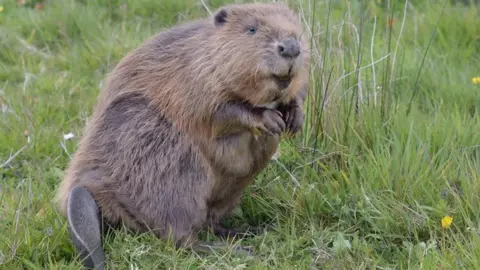Lowther Estate: Beavers released as part of five-year trial
 Nick Upton/Cornwall Wildlife Trust
Nick Upton/Cornwall Wildlife TrustTwo beavers have been released on a Cumbrian country estate as part of a five-year trial.
The animals, which were hunted to extinction in the UK in the 16th Century, have been homed in a 27-acre enclosure near Penrith to gauge their impact on farmland streams.
The male called Glen and female named Dragonfly were moved from Scotland.
Lowther Estate conservation manager Jim Bliss said he hoped they would have kits in the spring.
Dragonfly was trapped and relocated from the River Tay while Glen was rescued from the outflow of a hydroelectric plant in Perthshire by the Scottish Society for Prevention of Cruelty to Animals.
Camera traps have been set up to capture footage of the pair as they settle into their new home.
Allow Google YouTube content?
Mr Bliss said: "We're thrilled to finally have beavers at Lowther.
"We are leaving the beavers undisturbed so that they can adapt to each other and their new surroundings and we hope that there may be beaver kits in the spring.
"We have already seen signs of dam-building and canal systems, built to allow access to the woodland area.
"The dams they've constructed will hold back a lot of water, as well as storing silt. This all helps to improve the water quality and biodiversity of the area."
'Eco-system engineers'
David Harpley, chairman of Cumbria Beaver Group and conservation manager at Cumbria Wildlife Trust, said a trial in Devon showed beavers could slow the flow of flood water, improve water quality and create habitats for other wildlife.
"Beavers are often referred to as ecosystem engineers," he said.
"They make changes to their habitats, such as digging canal systems, damming smaller water courses, and coppicing tree and shrub species, creating open water habitats which provide a home for many other creatures."

Follow BBC North East & Cumbria on Twitter, Facebook and Instagram. Send your story ideas to [email protected].
